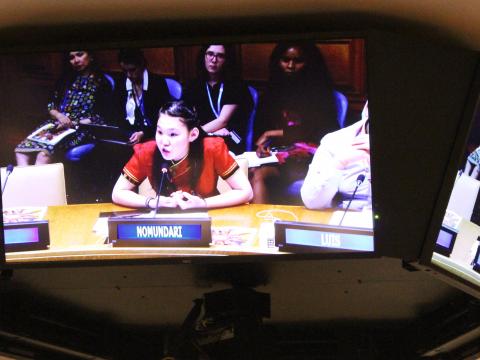Empowering children and young people on the global stage: the pitfalls of a one-time participation approach

By Patricio Cuevas-Parra, Director, Child Participation & Rights, Advocacy
In the last decades, we have witnessed an increasing recognition of children and young people's agency as one of the central tenets of social justice approaches that value children and young people's views in policy-formation, research and practice. This focus implies the acknowledgement of children and young people as agents who are able to influence their own social contexts and relationships. Furthermore, the international community has generated new spaces where children and young people can participate in global policy debate, such as the UN High Level Political Forum in New York, the European Development Days in Brussels and the UN Human Rights Council sessions in Geneva. These advances are welcome and celebrated. Yet, despite this, some people remain reluctant to recognise, or are even incredulous about, the abilities of children and young people to engage in public debate and represent others. One of the recurring criticisms which I consider artificial but crucial to address is the dichotomy between long-term child delegates and one-time delegates. This refers to the frequently observed decision to invite as many children and young people as possible to speak at global events without inviting them more than once. Interestingly, this rule does not apply to adult professionals, decision-makers and stakeholders.
Thinking on World Vision, a fundamental principle is to ensure that children and young people are at the centre of the global debate on issues relevant to them. This is done through the Young Leaders Programme, which is a network-based platform involving the dynamic collaboration of young leaders, aged 10 to 17 years, from different countries and regions. This platform seeks to empower young leaders, providing spaces and opportunities for them to foster social change. The Young Leaders Programme is framed within a broader strategy which seeks to build the capacity of young leaders who have demonstrated extraordinary skills in leading debates or campaigns that draw attention to and tackle children’s rights issues. In order to prepare children and young people, it is vital to equip them with the tools and knowledge needed to speak to global stakeholders and to raise the voices of their peers from the local to the global level. Obviously, children and young peoples’ initial abilities vary, but their capacity to speak out can be built over time by exposing them to as many events as possible. The point I am making here is that our experience demonstrates that we should not limit child delegates’ engagement to one-off events. Instead, by increasing their exposure, they are able to make their messages more articulate and robust, and to perform better.
One example of successful long-term engagement is Greta Thunberg from the movement Fridays for Future. In just a couple of years, she has become a global name and influencer. She started her activism while in school, but due to the attention she received from the media, she is now one of the most recognised faces on the planet. Her skills have improved over time, and her reputation has grown due to her extensive participation in conferences, panels and media interviews. Another example is Nomundari, a 15-year-old young leader from Mongolia, who has been a keynote speaker in UN events in New York and other global capitals. Her first speech in public was a challenging process for her, but she built her confidence, skills and identity around critical issues for her with time. She now considers herself a solid child representative.
Thus, the question is whether organisations should exclude Greta and Nomundari from participating in many events based solely on the one-time participation approach. The answer is no, they should not be excluded. Instead, they should be supported to build their capacity to represent others and make their views known to the public. That said, it is nonetheless vital to recognise that efforts need to be made to ensure the engagement of as many young leaders as possible. This can be achieved through a dual strategy of supporting both long-term and one-off participation approaches.
In turning the discussion towards representation and preparation, the role of child delegates varies from country to country and event to event. Nonetheless, their activities typically include raising awareness on issues relevant to children and young people, and providing input to key processes affecting them and their peers. In World Vision, the young leaders in our programmes are from marginalised communities characterised by poverty, social exclusion, and, in many cases, prone to violence and conflict. These features imply that young leaders require support to ensure equality of opportunity and capacity building to equip them with the skills needed to play an influential role in their global encounters.
Evidence shows that when young leaders are given the knowledge, resources and opportunities to participate in decision-making processes, they are well-prepared intellectually and emotionally to share global stages with relevant decision-makers. When equipped with the appropriate skills, child delegates can share their first-hand experiences relating to social justice issues and motivate other people for change. This process works better when child delegates participate continuously in the debate - the opposite of the one-off participation approach. Hence, they are able to become engaged as active, competent and innovative stakeholders in shaping and reshaping the world. Our task is to support them and change traditional mindsets that prevent children and young people from realising their fundamental right to participate in decision-making.